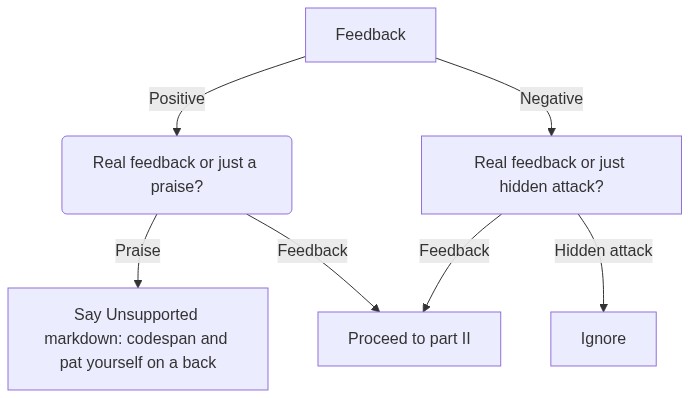On receiving feedback
Hello back, it’s time for the second resurrection of this blog. I actually did some thinking this time and I decided to write about everything that catches my attention, not only software engineering. So this blog will get way more eclectic, and alive, I hope.
Let’s talk about feedback
There’s so much info about giving feedback and I won’t cover that topic. There are better sources for that. What I want to cover today is receiving feedback.
Because I like to call myself creative person and hang out with creative people I get asked about feedback quite a lot. And because I’m a software engineer by trade I subconsciously look for patterns. You guessed it - there’s a pattern. Folks are receiving feedback wrong.
How you can receive feedback wrong? Isn’t that just an automatic success when someone gives feedback? Well, no. You can easily improve how much value feedback can give to you with few simple steps.
So let’s talk feedback.
Part I: Feedback that we didn’t ask for
This is the easier part. If someone bombards us with feedback we need to go through simple decision process.
Remember if that’s unsolicited feedback you can always ignore it.
Part II: Feedback we did ask for
First of all! Say “thank you”. Someone took time and effort to not only provide feedback but focus on your work. This is the least you could do. Feedback is not something that we just get. It’s not required, we are not obligated to give feedback to anyone. It’s a gesture, so be grateful for it.
Second. When I’m giving you feedback (before, during, after) I don’t care about your explanations. I don’t care how long you spent on this. How tired you were. What I hear is someone who wants to hear what are good and bad points but their ego is screaming. You’re telling me details I don’t need to know. You want me to give you honest feedback. Don’t make your ego scream in defense to not hear anything but praise.
Third - listen. This is kinda connected to second point. Don’t start rambling excuses why it’s not perfect. But also - listen carefuly. Check what’s just praise to make you feel good, see what’s valid feedback. You need to focus on what someone is saying and just hear it.
Fourth - know your feedback giver. This one is obvious but hard to grasp at the same time. If you made a dad rock song and you’re showing it to someone who doesn’t know/hates the genre feedback you’ll get will be way different than from the fan. Now, don’t think you need to go only to fans - if someone hates dad rock but genuinely likes your song - there may be something wrong with it (if you want to make dad rock song for dad rock song fans). You should also know if person is just being nice or truly praises you. This is obviously not always possible to know, but if you are not sure, ask.
Fifth - making notes is okay. This one is short :)
Sixth - ask if getting feedback after you applied some of the suggestions is okay. Also say if you cannot/don’t want to apply feedback, but be still thankful and show that it will be useful in the future. And don’t get discouraged if someone doesn’t want to give feedback again. They might be busy or not feel competent to see incremental change. Or whatever other reason - no one is obligated to give feedback :)
